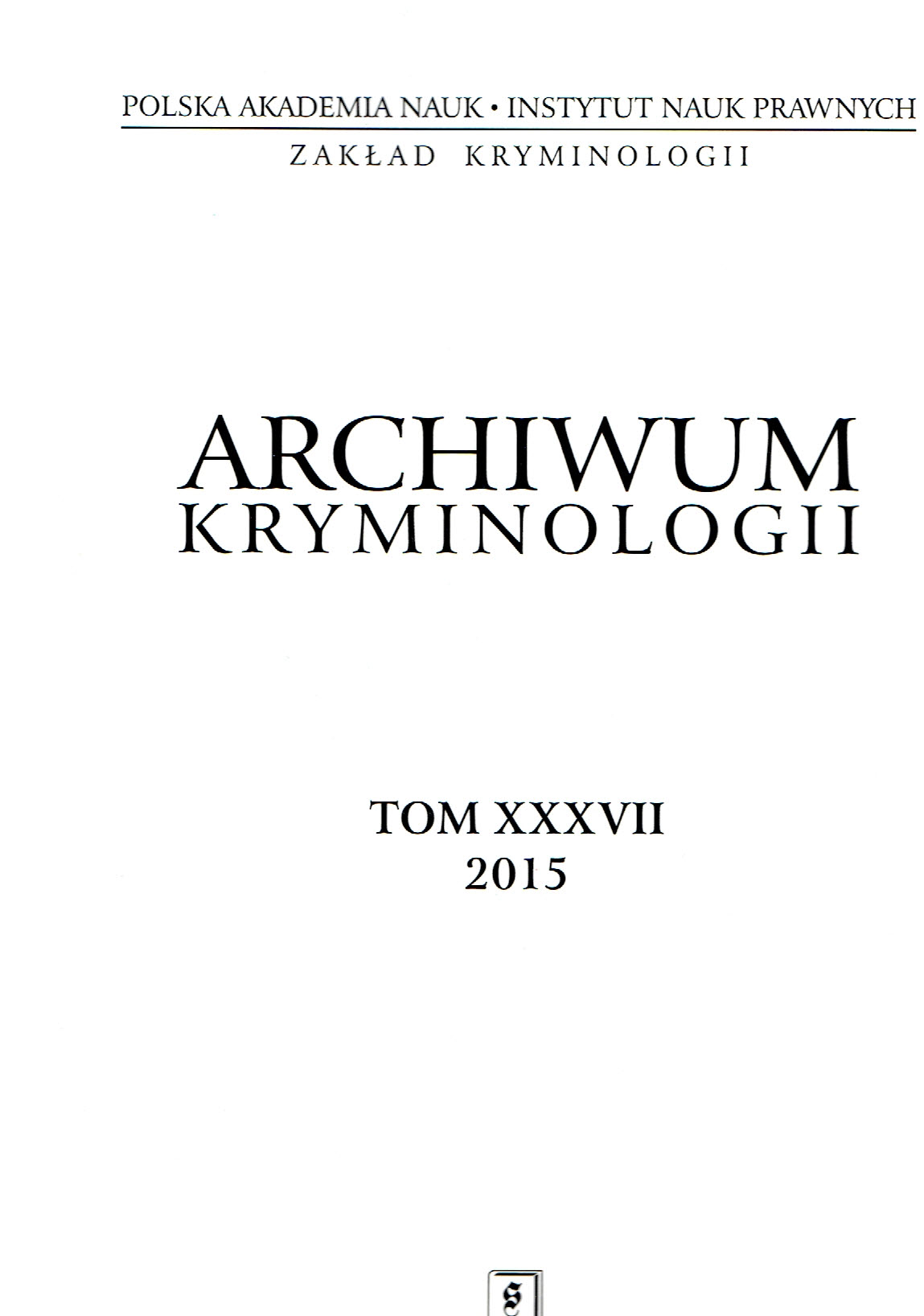PRZESTĘPSTWO NIELEGALNEGO PRZEKROCZENIA GRANICY W UJĘCIU HISTORYCZNYM, TEORETYCZNYM I PRAKTYCZNYM
The Crime of Illegal Border Crossing in History, Theory and Practice
Author(s): Witold Klaus, Dagmara Woźniakowska-FajstSubject(s): Law, Constitution, Jurisprudence, Criminal Law
Published by: Instytut Nauk Prawnych PAN
Keywords: illegal border crossing; crime
Summary/Abstract: Historical analysis of the issue of illegal crossings of national borders shows that theinstruments of criminal law reactions are more characteristic for totalitarian countriesthan democratic ones. In the case of Poland, over the course of the last few decadesa substantial change has taken place in the goal of protecting borders. Until the endof the 1980s, attempting to prevent its own citizens from leaving was the priority,while now the border controls are concentrated on stopping citizens from third-worldcountries entering.The offence stipulated in article 264 paragraph 2 of the Criminal Code penalises anact involving perpetrators illegally crossing Polish borders and do so by using specifiedforms of actions in the form of deceit, violence, threats or in co-operation with otherpeople. Awareness of the perpetrator in relation to the eventual location of the bordermust be based on their knowledge in this field. Here it should refer to normalisedpatterns and the so-called good model citizen, who should possess knowledge bothrelated to cultural norms and to certain facts (e.g. the layout of Poland’s borders). Thismodel is well enough confirmed in the case of Polish citizens. But it is harder to applydirectly to foreigners, specifically those coming from another cultural background.Due to this, determining the guilt of foreigners when it comes to committing crimeson the territory of our country relies on checking and accounting for the concretepersonal facts of the perpetrator, specifically their level of familiarity with Polish legaland socio-cultural norms, while taking into consideration their education, nationalorigin, profession, etc. A lack of appropriate awareness about the perpetrator, resultingfrom a lack of proper knowledge and information, would be the same as making anerror about the factual or legal meaning of the act. The effect of such an error wouldbe an inability to assign intentional fault to the perpetrator for committing the givenact. From 1 July 2015, in agreement with article 28 paragraph 1 of the Criminal Code,a person who remains in justified error about the circumstances constituting thehallmarks of a criminal act, has not committed a crime at all.The authors of the article draw attention to the most commonly occurring forms ofactivities by perpetrators from article 264 paragraph 2 of the Criminal Code, namely theillegal crossing of borders in co-operation with other people. This co-operation must beunderstood as various forms of collaboration between various people while committinga crime, often fulfilling various roles in this procedure. There is little to dispute the factthat responsibility for this will be assumed by an appropriate accomplice, and thereforethe agreement of several people in relation to the shared committing of a crime. Toconclude, all parties must have awareness that other people will be participating incommitting the crime, and articulate their will (intention) in the joint action. A lack ofagreement in this sense would therefore exclude any collaboration.From a procedural point of view, for an illegal border crossing to qualify as a crime,and not a misdemeanour, the fact must be proven that the accused crossed the border “in co-operation with other people”. In the opinion of the article’s authors, withoutproof of such circumstances, one cannot talk about a crime being committed at all. Perusal of court records raises objections about how this provision is being used inpractice. In none of the analysed recorded situations did border controls attempt toprove the circumstances of co-operation as a reasonable premise for accepting a groupcrossing the border. In some cases, the issue seems questionable.It is clear that the Polish state, in the name of its own interests, tries to ensure theflow of migrants is legal and controlled. But doubt from the article’s authors inspiresmaking use of the instruments of criminal law to aid this goal. Punishments, whichmight be placed upon perpetrators of illegal border crossing crimes, do not play a rolein most cases. One cannot speak about retaliation (because it is not an act which wouldarouse any social emotions and demand retaliation), nor speak about the resocialisationof perpetrators (since it is hard to treat the fact of crossing a border as violatingfundamental social values, and moreover the perpetrator is a foreigner and it is not inthe interest of the Polish state to reintroduce them to society but to expel them fromthe republic’s territory). Finally, it seems fruitless to argue about the preventative roleof punishments, since this perfectly serves the administration’s reaction (in the formof the practice of using detention and expulsion from institutions as well as a ban fromentering Poland’s territory).The position that it is not necessary to launch criminal proceedings againstthose people smuggled across the border was expressed in the so-called Declarationfrom Doha accepted in 2015, issued as a summary of the 13th UN Congress. In itsverdicts, the EU Court of Justice draws attentions to how it is inappropriate to imposepunishments on illegally-residing third world citizens that deprive their freedom solelyon the grounds that they have stayed without a valid reason in the territory of that state,contravening orders to leave that territory in a specified timeframe.In relation to the above, it is the belief of the authors that a justified recommendationwould be to withdraw from the frequently-used article 264 paragraph 2 of the Criminal Code, so that proceedings can be conducted in cases related to the illegal crossing ofborders.
Journal: Archiwum Kryminologii
- Issue Year: 2015
- Issue No: XXXVII
- Page Range: 191-222
- Page Count: 32
- Language: Polish

